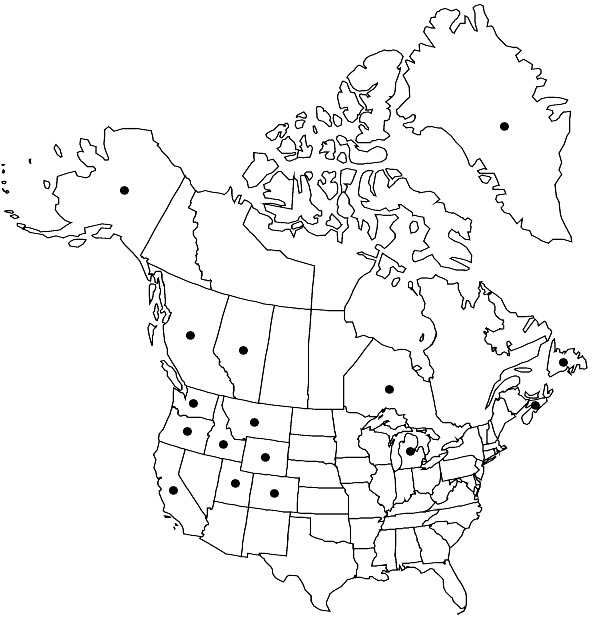Grimmia anomala
in W. P. Schimper, Syn. Musc. Eur. ed. 2, 270. 1876,.
Plants in tufts, yellowish green, blackish proximally. Stems 1.5–3.5 cm, small central strand present. Leaves irregularly imbricate when dry, erect when moist, oblong-lanceolate, gradually narrowed into a blunt chlorophyllose point, 1.5–2.5 × 0.4–0.8 mm, keeled, margins recurved on one or both sides, awns absent to very short, costa projecting on abaxial side; basal juxtacostal laminal cells quadrate to short-rectangular, straight, thin-walled; basal marginal laminal cells quadrate to short-rectangular with thickened transverse walls; medial laminal cells rounded-quadrate, walls slightly sinuose, thin- or thick-walled; distal laminal cells 1-stratose, in places 2-stratose, margins 1-stratose. Gemmae in clusters, globular, yellowish green to orange, multicellular, on hyaline, deformed leaf apices. Sexual condition dioicous. Seta straight to slightly arcuate when moist, 3–5 mm. Capsule extremely rare, exserted, brownish, oblong-ovoid, smooth, exothecial cells isodiametric, thick-walled, annulus present, operculum with long straight beak, peristome teeth orange, fully-developed, smooth proximally, perforated and papillose distally. Calyptra mitrate.
Habitat: Exposed, damp acidic rock in boreal and alpine meadows and slopes
Elevation: moderate to high elevations (200-3000 m)
Distribution

Greenland, Alta., B.C., Nfld. and Labr. (Nfld.), N.S., Ont., Alaska, Calif., Colo., Idaho, Mich., Mont., Oreg., Utah, Wash., Wyo., Eurasia.
Discussion
Because of the always abundant gemmae on leaf apices, Grimmia anomala has often been confused with G. hartmanii. Indeed, it has frequently been treated as a variety of that species (G. N. Jones 1933; E. Lawton 1971). However, as pointed out by O. Vitikainen (1969), the ecological and morphological features of G. hartmanii are so constant and distinct that there is no doubt that it can be treated as a separate species. Special features of G. anomala are stems with central strands, and longitudinal ridges on cell walls in the distal part of the leaf that resemble papillae in transverse section. It tends to prefer upland habitats. In contrast, G. hartmanii is principally a lowland species, frequently growing on boulders in forests. It lacks a central strand, and longitudinal ridges are absent. Its spreading, secund distal leaves taper to long, sharply keeled apices.
Selected References
None.